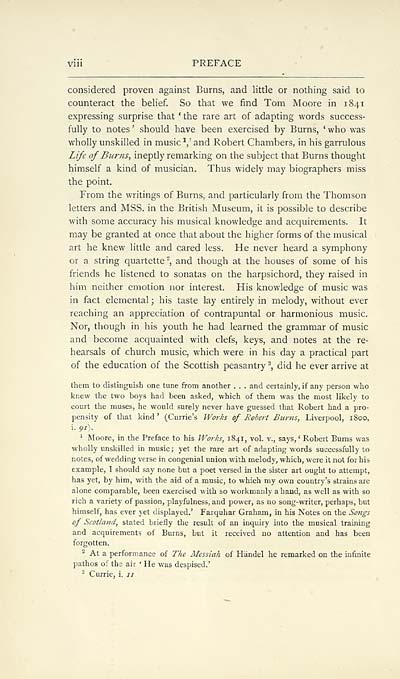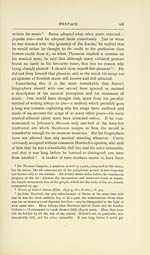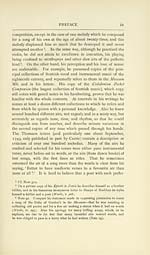Glen Collection of printed music > Printed music > Songs of Robert Burns
(20) Page viii
Download files
Complete book:
Individual page:
Thumbnail gallery: Grid view | List view

viii PREFACE
considered proven against Burns, and little or nothing said to
counteract the belief. So that we find Tom Moore in 1841
expressing surprise that ' the rare art of adapting words success-
fully to notes ' should have been exercised by Burns, ' who was
wholly unskilled in music ^,' and Robert Chambers, in his garrulous
Life of Burns, ineptly remarking on the subject that Burns thought
himself a kind of musician. Thus widely may biographers miss
the point.
From the writings of Burns, and particularly from the Thomson
letters and MSS. in the British Museum, it is possible to describe
with some accuracy his musical knowledge and acquirements. It
may be granted at once that about the higher forms of the musical
art he knew little and cared less. He never heard a symphony
or a string quartette^, and though at the houses of some of his
friends he listened to sonatas on the harpsichord, they raised in
him neither emotion nor interest. His knowledge of music was
in fact elemental ; his taste lay entirely in melody, without ever
reaching an appreciation of contrapuntal or harmonious music.
Nor, though in his youth he had learned the grammar of music
and become acquainted with clefs, keys, and notes at the re-
hearsals of church music, which were in his day a practical part
of the education of the Scottish peasantry ^, did he ever arrive at
them to distinguish one tune from another . . . and certainly, if any person who
knew the two boys had been asked, which of them was the most likely to
court the muses, he would surely never have guessed that Robert had a pro-
pensity of that kind ' (Currie's Works of Robert Burns, Liverpool, 1 800,
i. 91).
' Moore, in the Preface to his Works, 1841, vol. v., says, ' Robert Burns was
wholly unskilled in music; yet the rare art of adapting words successhdly to
notes, of wedding verse in congenial union with melody, which, were it not for his
example, I should say none but a poet versed in the sister art ought to attempt,
has yet, by him, with the aid of a music, to which my own country's strains are
alone comparable, been exercised with so workmanly a hand, as well as with so
rich a variety of passion, playfulness, and power, as no song-writer, perhaps, but
himself, has ever yet displayed.' Farquhar Graham, in his Notes on the Songs
of Scotland, stated briefly the result of an inquiry into the musical training
and acquirements of Burns, but it received no attention and has been
forgotten.
2 At a performance of The Messiah of Handel he remarked on the infinite
pathos of the air ' He was despised.'
^ Currie, i. 11
considered proven against Burns, and little or nothing said to
counteract the belief. So that we find Tom Moore in 1841
expressing surprise that ' the rare art of adapting words success-
fully to notes ' should have been exercised by Burns, ' who was
wholly unskilled in music ^,' and Robert Chambers, in his garrulous
Life of Burns, ineptly remarking on the subject that Burns thought
himself a kind of musician. Thus widely may biographers miss
the point.
From the writings of Burns, and particularly from the Thomson
letters and MSS. in the British Museum, it is possible to describe
with some accuracy his musical knowledge and acquirements. It
may be granted at once that about the higher forms of the musical
art he knew little and cared less. He never heard a symphony
or a string quartette^, and though at the houses of some of his
friends he listened to sonatas on the harpsichord, they raised in
him neither emotion nor interest. His knowledge of music was
in fact elemental ; his taste lay entirely in melody, without ever
reaching an appreciation of contrapuntal or harmonious music.
Nor, though in his youth he had learned the grammar of music
and become acquainted with clefs, keys, and notes at the re-
hearsals of church music, which were in his day a practical part
of the education of the Scottish peasantry ^, did he ever arrive at
them to distinguish one tune from another . . . and certainly, if any person who
knew the two boys had been asked, which of them was the most likely to
court the muses, he would surely never have guessed that Robert had a pro-
pensity of that kind ' (Currie's Works of Robert Burns, Liverpool, 1 800,
i. 91).
' Moore, in the Preface to his Works, 1841, vol. v., says, ' Robert Burns was
wholly unskilled in music; yet the rare art of adapting words successhdly to
notes, of wedding verse in congenial union with melody, which, were it not for his
example, I should say none but a poet versed in the sister art ought to attempt,
has yet, by him, with the aid of a music, to which my own country's strains are
alone comparable, been exercised with so workmanly a hand, as well as with so
rich a variety of passion, playfulness, and power, as no song-writer, perhaps, but
himself, has ever yet displayed.' Farquhar Graham, in his Notes on the Songs
of Scotland, stated briefly the result of an inquiry into the musical training
and acquirements of Burns, but it received no attention and has been
forgotten.
2 At a performance of The Messiah of Handel he remarked on the infinite
pathos of the air ' He was despised.'
^ Currie, i. 11
Set display mode to: Large image | Transcription
Images and transcriptions on this page, including medium image downloads, may be used under the Creative Commons Attribution 4.0 International Licence unless otherwise stated. ![]()
| Special collections of printed music > Glen Collection of printed music > Printed music > Songs of Robert Burns > (20) Page viii |
|---|
| Permanent URL | https://digital.nls.uk/91259882 |
|---|
| Description | Scottish songs and music of the 18th and early 19th centuries, including music for the Highland bagpipe. These are selected items from the collection of John Glen (1833 to 1904). Also includes a few manuscripts, some treatises, and other books on the subject. |
|---|
| Description | The Glen Collection and the Inglis Collection represent mainly 18th and 19th century Scottish music, including Scottish songs. The collections of Berlioz and Verdi collected by bibliographer Cecil Hopkinson contain contemporary and later editions of the works of the two composers Berlioz and Verdi. |
|---|

